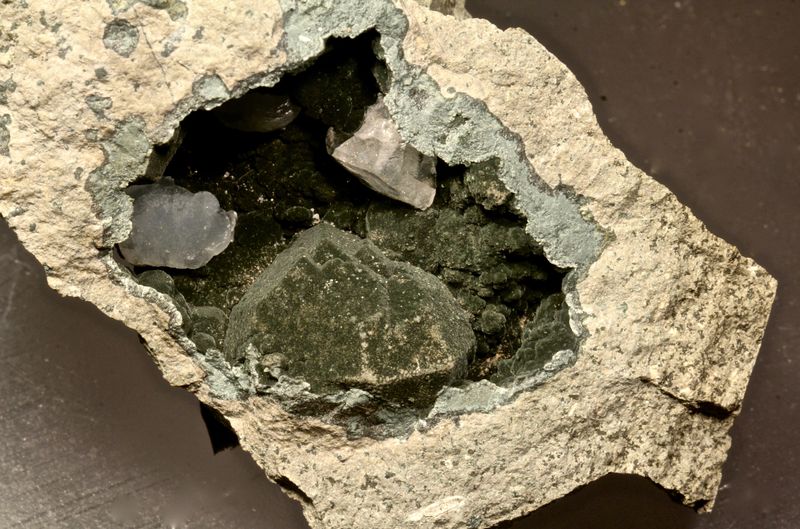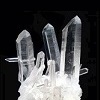| View previous topic :: View next topic |
| Author |
Message |
vic rzonca

Joined: 18 Nov 2008
Posts: 820
Location: MA



|
 Posted: Oct 07, 2018 13:24 Post subject: "ite" Posted: Oct 07, 2018 13:24 Post subject: "ite" |
|
|
As I was working in the wood shop today, and thinking about humboldtine, this question popped into my pea sized brain. Why minerals names end in "ite" so much. I found this: "The suffix "ite" is derived from the Greek word lithos (from its adjectival form -ites), meaning rock or stone. So, minerals named that depends on the earlier part of the name. Olivine would be a mineral that pertains to olive, and so possibly has an olive colour." Found in "English Language & Usage". I'm sure you all knew that.
| Mineral: | Pumpellyite on Analcime. |
| Locality: | | O&G Southbury Quarry, Southbury, New Haven County, Connecticut, USA |  |
|
| Dimensions: | 6 cm. pocket |
| Description: |
|
| Viewed: |
31465 Time(s) |

|
|
|
| Back to top |
|
 |
Bob Harman
Joined: 06 Nov 2015
Posts: 765



|
 Posted: Oct 07, 2018 13:39 Post subject: Re: "ite" Posted: Oct 07, 2018 13:39 Post subject: Re: "ite" |
|
|
| In the US "celestite" is preferred by some while the rest of the mineral world seems to prefer "celestine" as the mineral name....... BOB
|
|
| Back to top |
|
 |
John S. White
Site Admin

Joined: 04 Sep 2006
Posts: 1298
Location: Stewartstown, Pennsylvania, USA



|
 Posted: Oct 07, 2018 13:54 Post subject: Re: "ite" Posted: Oct 07, 2018 13:54 Post subject: Re: "ite" |
|
|
Celestine has been adopted by the international organization that rules on such things. It was selected over celestite because it has been established that celestine has priority, that is, celestine was seen to have been used in the literature before celestite. I would say that celestine is now in wide use in the U.S. but old habits can be hard to change so many collectors and dealers here still use celestite, just as with baryte vs. barite. In this case baryte is now the officially approved form.
Not sure what Vic's point is in that he appears to have answered his own question except that his example "olivine" is an unfortunate one because olivine is no longer a valid mineral species. Try rutile. Many of the better mineral texts provide the reason for the name given to every mineral.
_________________
John S. White
aka Rondinaire |
|
| Back to top |
|
 |
Fiebre Verde

Joined: 11 Sep 2013
Posts: 944
Location: Paris Area



|
 Posted: Oct 07, 2018 13:59 Post subject: Re: "ite" Posted: Oct 07, 2018 13:59 Post subject: Re: "ite" |
|
|
| Bob Harman wrote: | | In the US "celestite" is preferred by some while the rest of the mineral world seems to prefer "celestine" as the mineral name....... BOB |
In French, there are 2 words to designate the mineral fluorite: "fluorite" and "fluorine"
Gérard
|
|
| Back to top |
|
 |
vic rzonca

Joined: 18 Nov 2008
Posts: 820
Location: MA



|
 Posted: Oct 07, 2018 14:20 Post subject: Re: "ite" Posted: Oct 07, 2018 14:20 Post subject: Re: "ite" |
|
|
"Not sure what Vic's point is in that he appears to have answered his own question except that his example "olivine" is an unfortunate one because olivine is no longer a valid mineral species." JW.
The point was the "pea sized brain", John. My first stop was Google. Kind of stream of consciousness stuff.
|
|
| Back to top |
|
 |
alfredo
Site Admin

Joined: 30 Jan 2008
Posts: 1014



|
 Posted: Oct 07, 2018 14:55 Post subject: Re: "ite" Posted: Oct 07, 2018 14:55 Post subject: Re: "ite" |
|
|
In Vic's defense, let's note that he called olivine a "mineral" (which it certainly is), and did not imply that it was a mineral "species" name.
I blame Joe Mandarino for the pressure felt by many collectors to use only species names on labels, and to view usage of variety/series/group names as somehow inferior. Unnecessarily restrictive, in my view, akin to telling a dog owner that they are not allowed to use "poodle" but must always call their pet a "Canis lupus familiaris".
|
|
| Back to top |
|
 |
Tobi
Site Admin

Joined: 07 Apr 2009
Posts: 4251
Location: Germany



|
 Posted: Oct 08, 2018 02:49 Post subject: Re: "ite" Posted: Oct 08, 2018 02:49 Post subject: Re: "ite" |
|
|
| alfredo wrote: | | Unnecessarily restrictive, in my view, akin to telling a dog owner that they are not allowed to use "poodle" but must always call their pet a "Canis lupus familiaris". |
Great, Alfredo, I'm laughing my a** off, you're a great Homo sapiens funnyensis :)))))))))))))
The German language (or better: the German nomenclature for minerals) is also quite inconsistent concerning the suffixes: Most names end on -it (Fluorit, Galenit, Sphalerit, Pyromorphit, Magnetit ...) while there are some on -in like Erythrin, Coelestin, Adamin. Actually they "should" be Erythrit, Coelestit or Adamit - but I guess German language is not really famous for coherent word endings ;-)
|
|
| Back to top |
|
 |
lluis
Joined: 17 Nov 2006
Posts: 719


|
 Posted: Oct 08, 2018 08:43 Post subject: Re: "ite" Posted: Oct 08, 2018 08:43 Post subject: Re: "ite" |
|
|
Hi, Tobi
Not catalan, spanish, italian and the latin languages I know are too strict in ends of words....
Mineralogy (or something related to this) is very, very old.... And old names and new ideas do not need to agree...
In chemistry, trivial names are used.
Acetic acid, Essigsaure, should be called/named ethanoic acid...
I only remember that was said that completely systematic names were used in DDR...
I wish God have blessed them when they should use the systematic name for camphor.... or worse even that for adrenaline....or cortisone... (that I only have found in semi-systematic....)
With best wishes
Lluís
|
|
| Back to top |
|
 |
alfredo
Site Admin

Joined: 30 Jan 2008
Posts: 1014



|
 Posted: Oct 08, 2018 09:12 Post subject: Re: "ite" Posted: Oct 08, 2018 09:12 Post subject: Re: "ite" |
|
|
Japanese mineral suffixes are interesting - Most mineral names end in -seki or -ishi, both of which are written 石 in chinese characters, which means "stone". But some mineral groups have more detailed "-seki" suffixes, like -denkiseki 電気石 for the huge group of tourmaline species (which means "electric stone"), or -senseki for amphiboles, -kiseki for pyroxenes, -fusseki for zeolites, and -chohseki for many of the feldspars. Micas however don't use a -seki suffix at all; they all end in "-unmo". And metallic ore minerals end in -koh (like the old german "-kies" suffix).
Although I don't know Chinese, I can say that its mineral suffix structure is similar (Japanese writing, and much of its ancient technical terminology, were afterall derived from chinese).
|
|
| Back to top |
|
 |
John S. White
Site Admin

Joined: 04 Sep 2006
Posts: 1298
Location: Stewartstown, Pennsylvania, USA



|
 Posted: Oct 08, 2018 10:10 Post subject: Re: "ite" Posted: Oct 08, 2018 10:10 Post subject: Re: "ite" |
|
|
Show off! I am not changing my labels to Japanese. Hope to see you soon in Munich.
_________________
John S. White
aka Rondinaire |
|
| Back to top |
|
 |
John Betts
Joined: 07 Jun 2012
Posts: 210
Location: New York City


|
 Posted: Oct 08, 2018 10:15 Post subject: Re: "ite" Posted: Oct 08, 2018 10:15 Post subject: Re: "ite" |
|
|
| alfredo wrote: | | I blame Joe Mandarino for the pressure felt by many collectors to use only species names on labels, and to view usage of variety/series/group names as somehow inferior. Unnecessarily restrictive, in my view, akin to telling a dog owner that they are not allowed to use "poodle" but must always call their pet a "Canis lupus familiaris". |
Joe personally told me to relax and freely use the variety/series names. He said it was perfectly acceptable to use obsolete mineral names like biotite, lepidolite, wolframite unless testing established the exact species. You know Joe - he was a very nice guy and did not intend to complicate mineral collecting. He just happened to author/co-author the Glossary...
_________________
John Betts |
|
| Back to top |
|
 |
John S. White
Site Admin

Joined: 04 Sep 2006
Posts: 1298
Location: Stewartstown, Pennsylvania, USA



|
 Posted: Oct 08, 2018 10:40 Post subject: Re: "ite" Posted: Oct 08, 2018 10:40 Post subject: Re: "ite" |
|
|
I fully agree with Joe’s comment about using obsolete mineral names. They are convenient and everyone knows what they mean.
_________________
John S. White
aka Rondinaire |
|
| Back to top |
|
 |
Riccardo Modanesi
Joined: 07 Nov 2011
Posts: 631
Location: Milano


|
 Posted: Oct 09, 2018 08:50 Post subject: Re: "ite" Posted: Oct 09, 2018 08:50 Post subject: Re: "ite" |
|
|
Hi to everybody!
In Italian we use the suffix "ite" for any kind of mineral, but for celestine (which we call "celestina") or celsian ("celsiana") etc. Acetic acid = acido acetico! And often we transform the letter-group "ph-" in the simple "f". For example, phosphosiderite (English) = fosfosiderite (Italian); phlogopite (English) = flogopite (Italian).
Greetings from Italy by Riccardo.
_________________
Hi! I'm a collector of minerals since 1973 and a gemmologist. On Summer I always visit mines and quarries all over Europe looking for minerals! Ok, there is time to tell you much much more! Greetings from Italy by Riccardo. |
|
| Back to top |
|
 |
|





